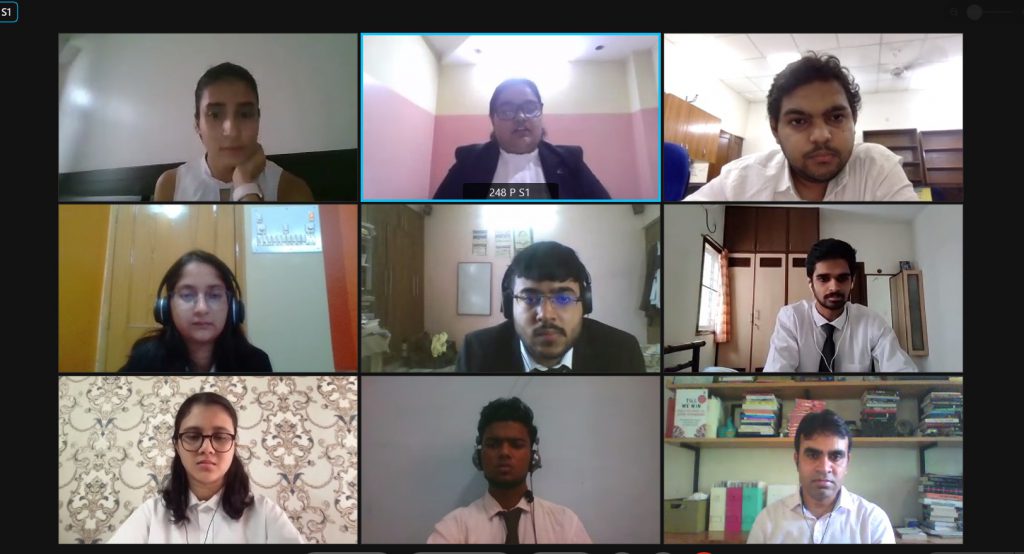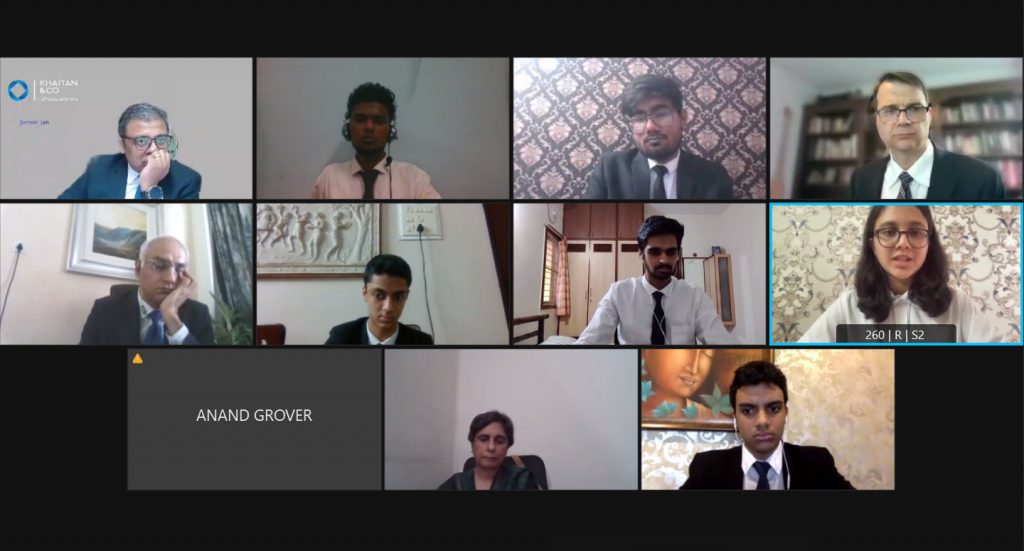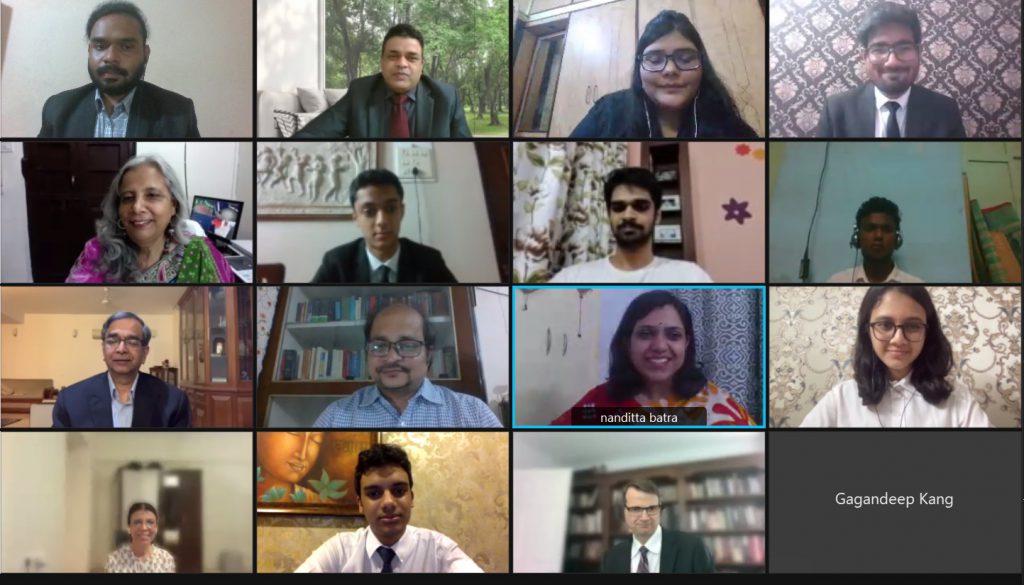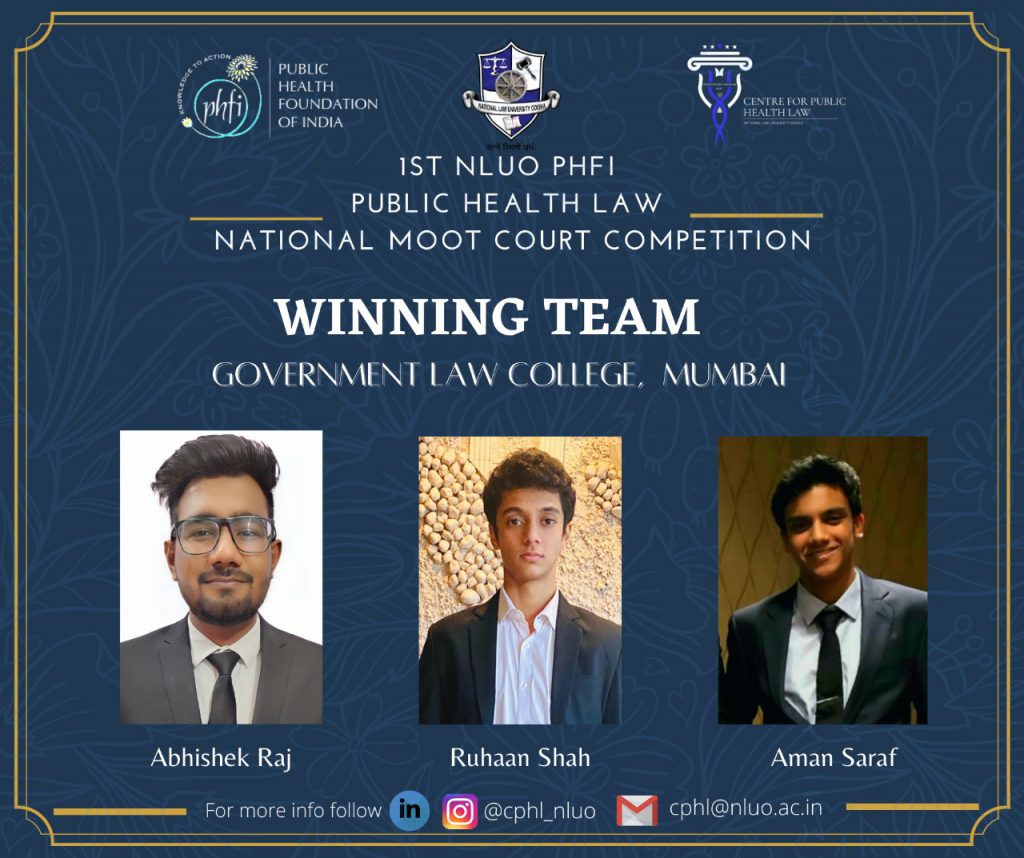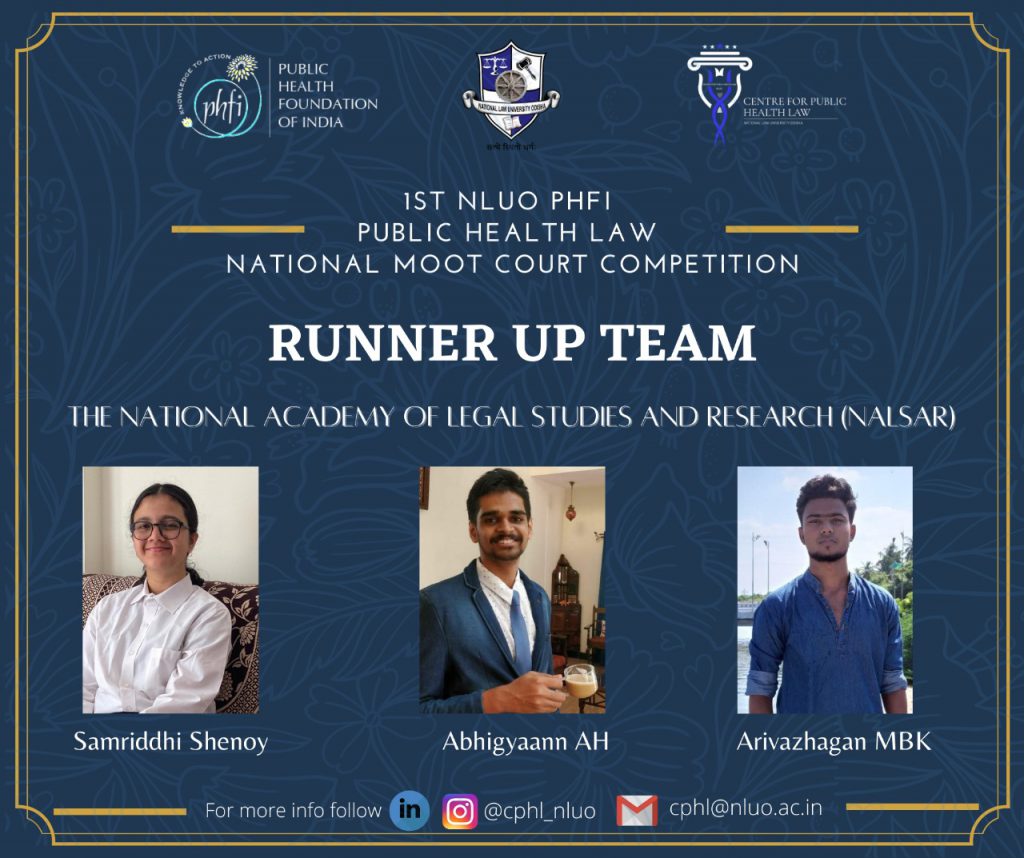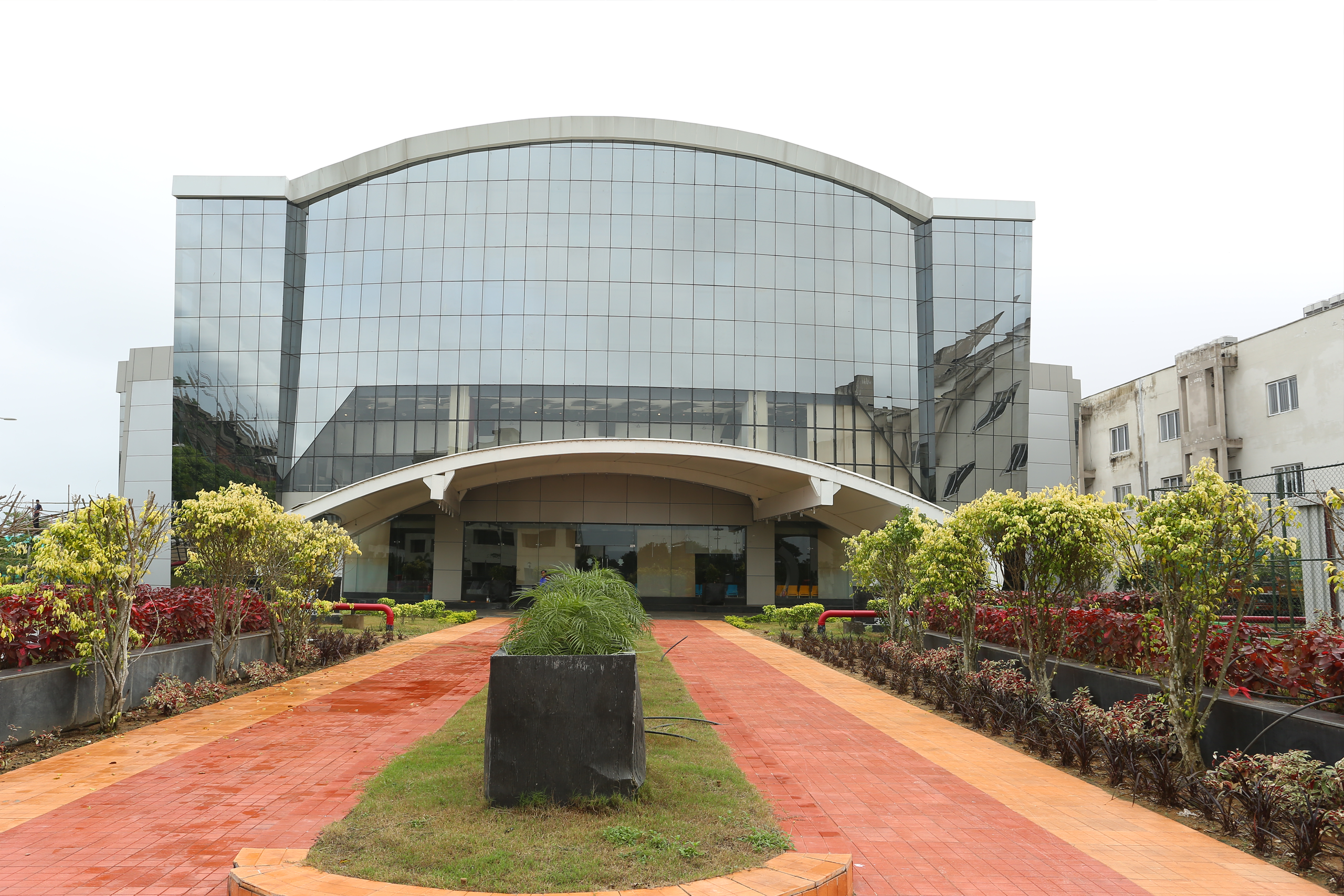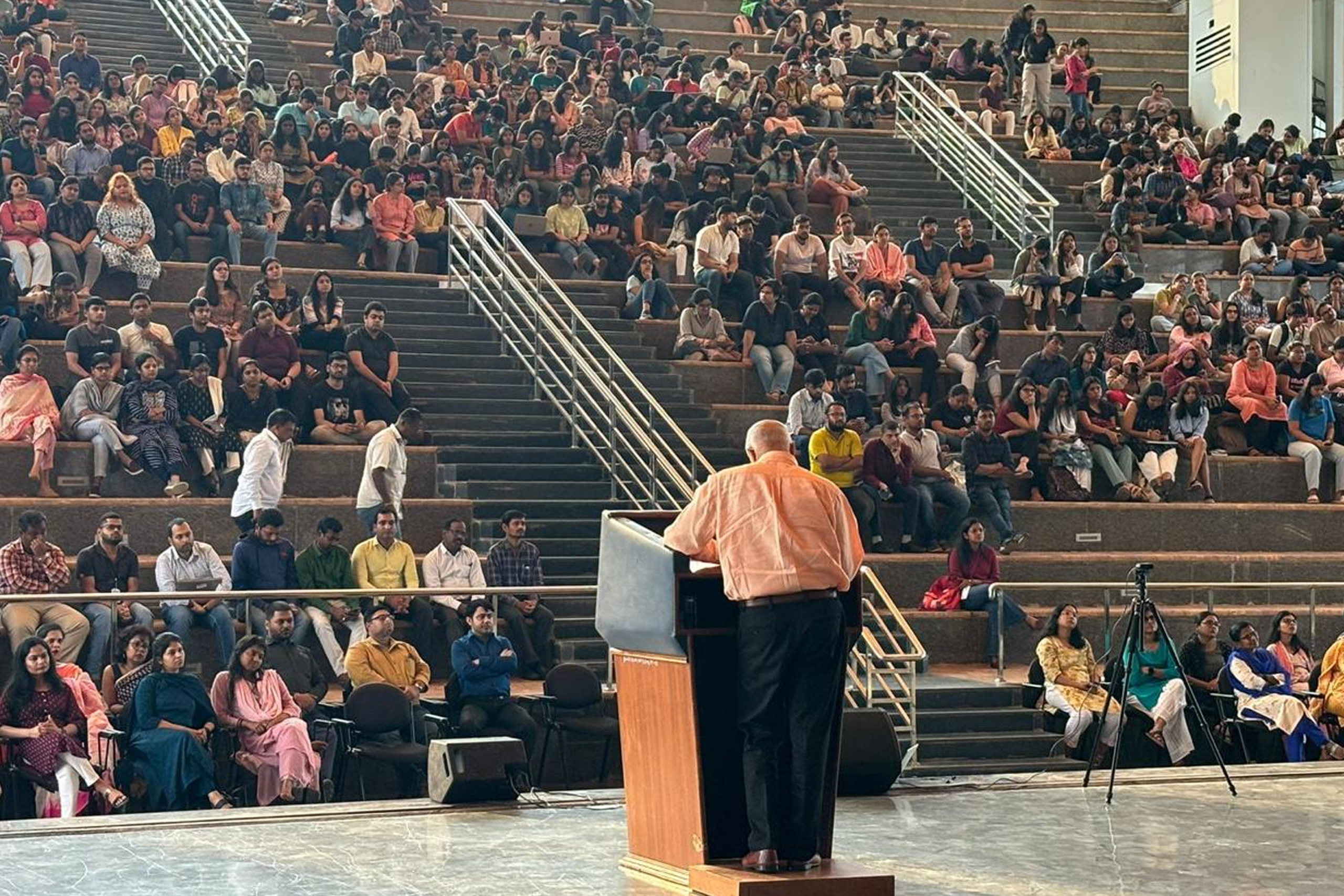News Category: News
“Quotation Call Notice for Tent House related Service.”
31 Jul 2021
No content available
“Quotation Call Notice for Printing Work.”
30 Jul 2021
No content available
“Quotation Call Notice for Still Photography and Videography.”
30 Jul 2021
No content available
ICSI and NLUO conduct a webinar on Expanding Possibilities: The Pathway Ahead
29 Jul 2021
National Law University, Odisha signed an MoU with the Institute of Company Secretaries of India, New Delhi in 2020 for academic collaboration in terms of jointly conducting various conferences / seminars / workshops / faculty development programs / trainings and carrying out other activities for the benefits of the students, members and faculty members of the both the organizations.
In furtherance of the abovementioned objectives, NLUO together with ICSI conducted a webinar titled ‘Expanding Possibilities: The Pathway Ahead’ on 27 July, 2021. The event was graced by the presence of CS Nagendra D. Rao, President, ICSI, Prof. (Dr.) Yogesh Pratap Singh, Registrar National Law University Odisha, Ms. Kaushiki Brahma, Assistant Professor of LawNational Law University Odisha, Mr. A. K. Srivastava Joint Secretary, Dte of Student Services, ICSI, CS (Dr.) Mayank Tiwari, Assistant Professor of Law National Law University Odisha, Ms. Arti J Shailendar, Joint Director- Career Awareness Cell, Dte of Student Services, ICSI.
The event started with the presidential address of CS Nagendra D. Rao Sir who explained the importance of the intersection between law and company secretariat course and as to how the two move in consonance with each other. After which Prof. (Dr.) Yogesh Pratap Singh briefly shed light on the objectives of the MoU signed between the two associations and as to how the same would benefit the members on both sides.
Ms. Kaushiki Brahma acquainted the attendees with the developments that have taken place in the realm of Corporate Social Responsibility with a special focus on the changing dynamics in light of the pandemic COVID 19. After which, Mr. A. K. Srivastava briefed the students about the Company Secretariat course. It was also informed that ICSI is willing to provide a special fees concession to students who have faced their parents.
The wonderful session ended with concluding remarks by CS (Dr.) Mayank Tiwari and Ms. Arti J Shailendar and was found very insightful by the attendees.
“A Guest lecture by Mr. Steve Levitsky on The Challenges to Big Tech”.
27 Jul 2021
The Centre for Corporate Law successfully conducted its first guest lecture titled “The Challenges to Big Tech” on 23 July, 2021 by Mr. Steve Levitsky<, an antitrust connoisseur,?ho delved into the issues being faced by the Big Tech in the United States. The lecture provided the attendees a great insight into the subject matter.
Mr. Steve is a Merger Clearance and Antitrust Counselling Manhattan, Ney York, United States, with more than 30 years of experience at leading international firms like Shea & Gould, LeBoeuf Lamb (and Dewey & LeBoeuf), and DLA Piper. He has advised general counsel and board members of Fortune 500 and Fortune 100 companies on mergers, joint ventures, antitrust compliance, and antitrust counseling.
The lecture was open to all legal practitioners, academicians and students alike and was found to be extremely informative by the attendees.
“NLUO & India Justice Report’s Conference on Odisha’s Justice System: Capacity Management.”
27 Jul 2021
National Law University Odisha in collaboration with India Justice Report team organised a conference dated 24th July, 2021. The conference sought to present Odisha-specific insights to the honourable custodians of the four pillars of the formal justice system i.e., judiciary, police, prisons and legal aid.
The conference witnessed the keynote address by Hon’ble Dr. Justice S. Muralidhar, Chief Justice of Orissa High Court, wherein he emphasised on the role of bar in the judicial system. The full day conference was cherished by insightful valuables by multi-disciplinary eminent. The conference was divided into two sessions in which Session 1 discussed about ‘Judiciary & Legal Aid’ and the Session 2 discussed about ‘Police and Prison’.
The first session was initiated by Ms. Maja Daruwala Chief Editor, India Justice Report who introduced the India Justice Report 2020, which was followed by the discussions of Hon’ble Mr. Justice Sangam Kumar Sahoo Judge, Orissa High Court and Hon’ble Mr. Justice Bibhu Prasad Routray Judge, Orissa High Court on the findings related to state judiciary on “India Justice Report 2020 findings on Judiciary in Odisha”. Learned lordships asserted on justice delayed being justice denied, and recommended the plausible steps that could be taken by the state judiciary in reducing pendency of the cases. The session was presented by Mr. Surya Prakash BS, Fellow and Programme Director at DAKSH and moderated by Prof. (Dr.) Yogesh Pratap Singh, Registrar, NLUO.
Furthermore, Hon’ble Mr. Justice Sanjay Kumar Mishra Judge, Orissa High Court & Chairperson – Orissa State Legal Services Authority and Ms. Madhurima Dhanuka, Programme Head, Prison Reforms Programme, CHRI discussed on findings related to legal aid on “India Justice Report 2020 Findings on Legal Aid in Odisha”. Hon’ble Justice appreciating the Indian Justice Report lauded it to be fair and comprehensive and encouraged the young students of law to venture into litigation practices and judiciary. The session was presented by – Ms. Madhurima Dhanuka, Programme Head, Prison Reforms Programme, CHRI and moderated by Dr. Kuntirani Padhan, NLUO.
The second session was initiated by Shri Abhay, IPS Director General of Police, Odisha who discussed on findings related to state police on “India Justice Report 2020 Findings on Police in Odisha.” He welcomed the initiative of Indian Justice Report, but opined that the nitty-gritties of the police system cannot be quantified by statistical numbers. The session was moderated by Ms. Eluckiaa A., NLUO.
Furthermore, Shri Santosh Kumar Upadhyay, IPS Director General of Prisons and Director of Correctional Services, Odisha discussed on findings related to prisons on “India Justice Report 2020 Findings on Prisons in Odisha.” He highlighted the issues faced in state prisons such as training, overcrowding problems, fiscal inefficiency. Additionally, he emphasised on the use of technology in solving issues faced by prison. The session was presented by Mr. Vipul Mudgal, Director, Common Cause and moderated by Ms. Nanditta Batra, NLUO.
The conference witnessed fruitful open discussions and engaged practitioners, duty holders within the system, civil society and academia to improve Odisha’s justice system. The full-day conference was concluded by Prof. Ved Kumari, VC, NLUO with a vote of thanks by Prof. (Dr.) Yogesh Pratap Singh, Registrar, NLUO.
Orientation Session on Student Support Platform.
22 Jul 2021
19.07.2021
An orientation session was organised by the University administration to familiarise the current students with the newly launched Student Support Platform to be used as a single gateway for grievance redressal mechanism. Prof. Yogesh Pratap Singh, Registrar NLUO explained the rationale behind moving to new system and creasing out the difficulties faced by students particular to the online education. ?e highlighted that the pandemic has not brought about online classes but also reshaped the ways to address institutional concerns and grievances.?He underscored that the aim of student support platform was to create a safe and responsive environment for each one of the students. ?his was followed by a doubt clearing session on the Proctorical Process and Internal Complaints Committee Mechanism. Dr Rangin Pallav Tripathy, Proctor along with Deputy Proctors Ms. Rishika Khare and Dr. Mayank Tiwari held a session on the powers and duties of Proctor’s office. The second leg of the orientation process was to demystify the internal complaint mechanism to deal with sexual harassment matters. Ms. Nanditta Batra, Member of Internal Complaints Committee and Member of Drafting Committe of NLUO Sexual Harassment Prevention, Prohibition & Redressal Regulations, 2021 explained the ICC mechanism and answered the queries in that regard.
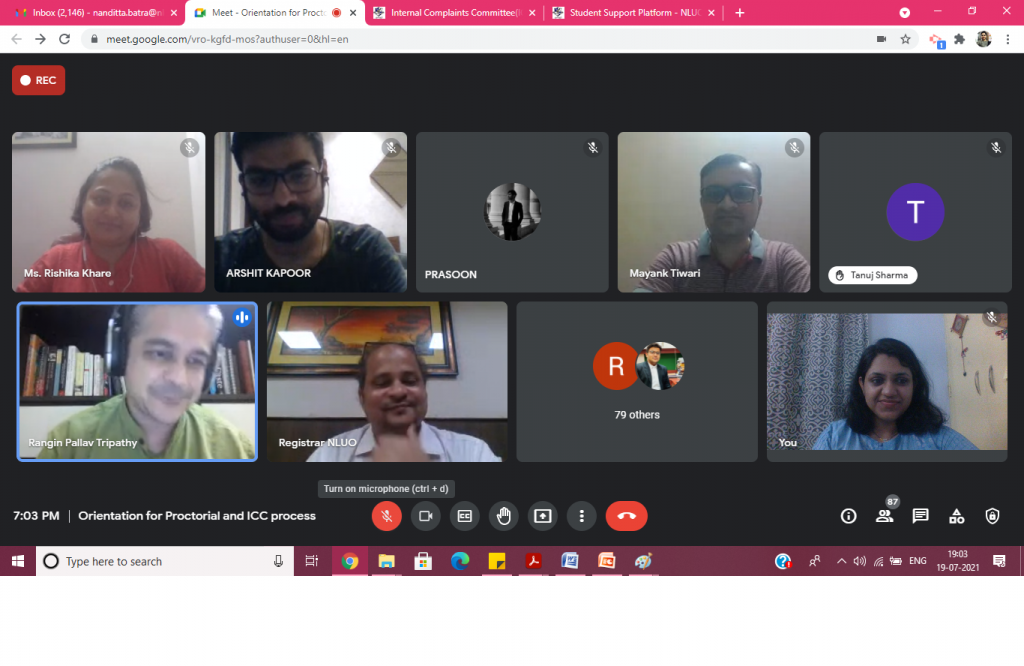
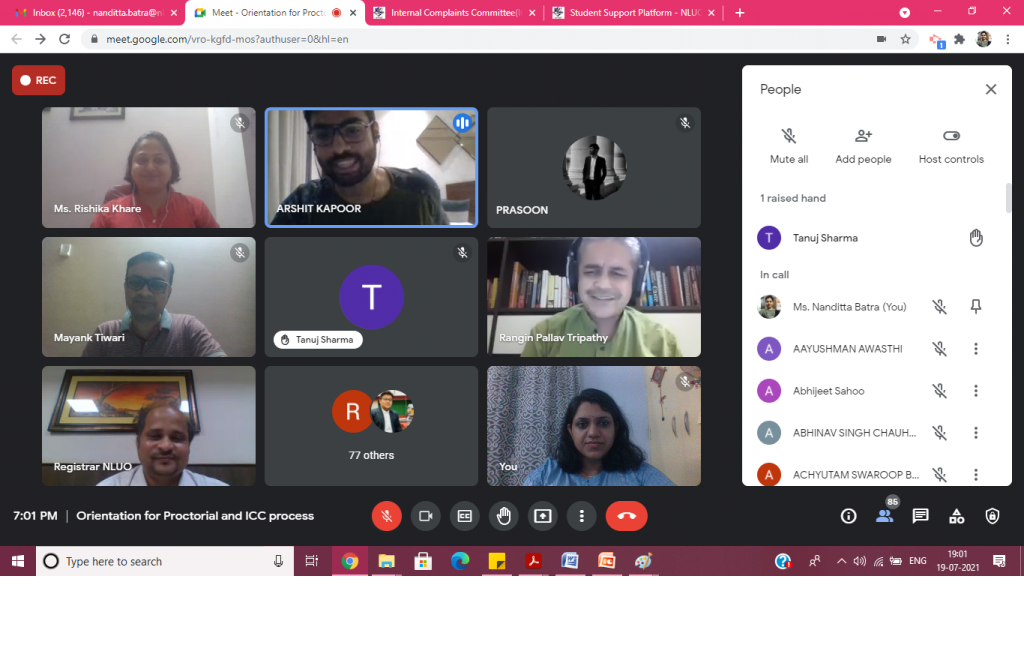
“The Intellectual Property Analysis and Advocacy Centre (IPAAC) began the Academic Year, 2021-2022 with a Turncoat Competition on 10th July 2021. “
12 Jul 2021
The Intellectual Property Analysis and Advocacy Centre (IPAAC) began the Academic Year, 2021-2022 with a Turncoat Competition on 10th July 2021. The event was organised with the objective to increase awareness about Intellectual Property (IP) Rights among students to instigate discussions and familiarise students with contemporary situations involving IP Rights and give them a platform to engage and enhance their public speaking skills.
Teams of four engaged with propositions ranging over several contemporary issues including compulsory licensing, vaccine waivers and artificial intelligence. The competition did not require prior specialised knowledge in IP Rights and was aimed at serving as the starting point of students’ interest in IP Law.
The team coming first is:
Kushagra Dash (Batch 2020-2025), Mohit Chand (Batch 2020-2025), and Disha Bandhopadhyay (Batch 2020-2025) bagging the first position as the best team.
The Individual winners are:
Kushagra Dash (Batch 2020-2025), who was declared the Best Speaker, with Shreya Kapoor (Batch 2019-2024) coming in as runner up. The third position was taken by Tanuj Sharma (Batch 2019-2024).
The Centre highly encourages the enthusiasm of the participants and hopes to continue with similar initiatives to increase the awareness of IP Rights among students.
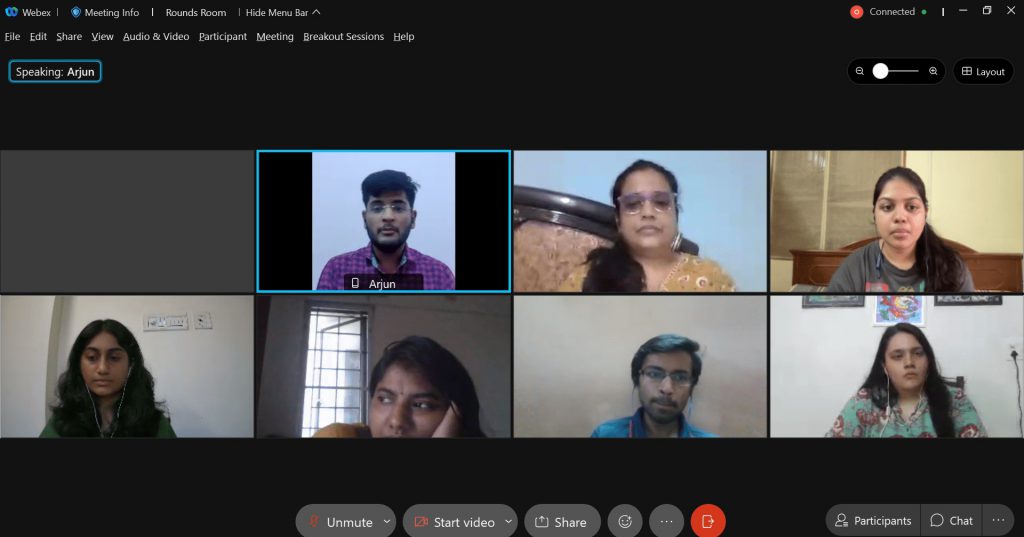
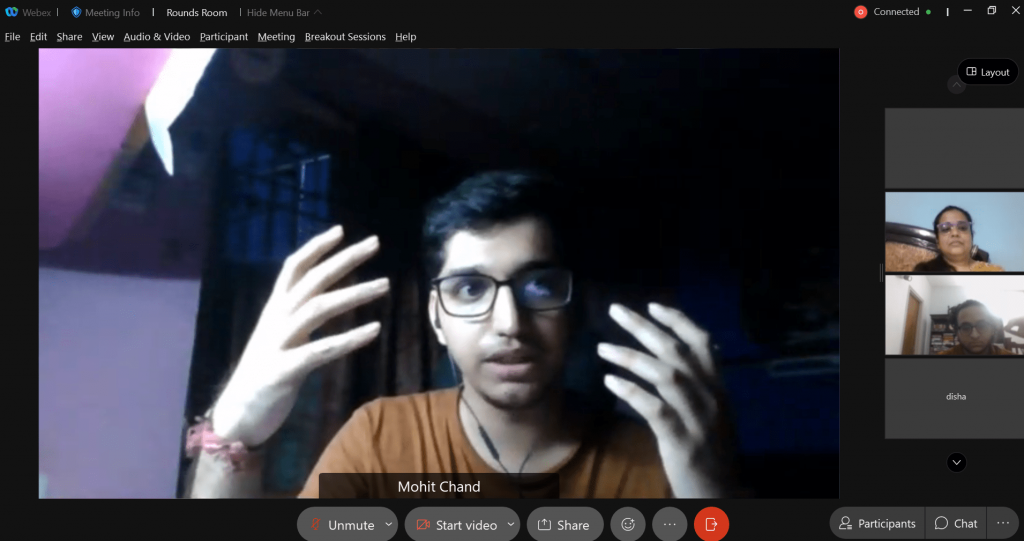
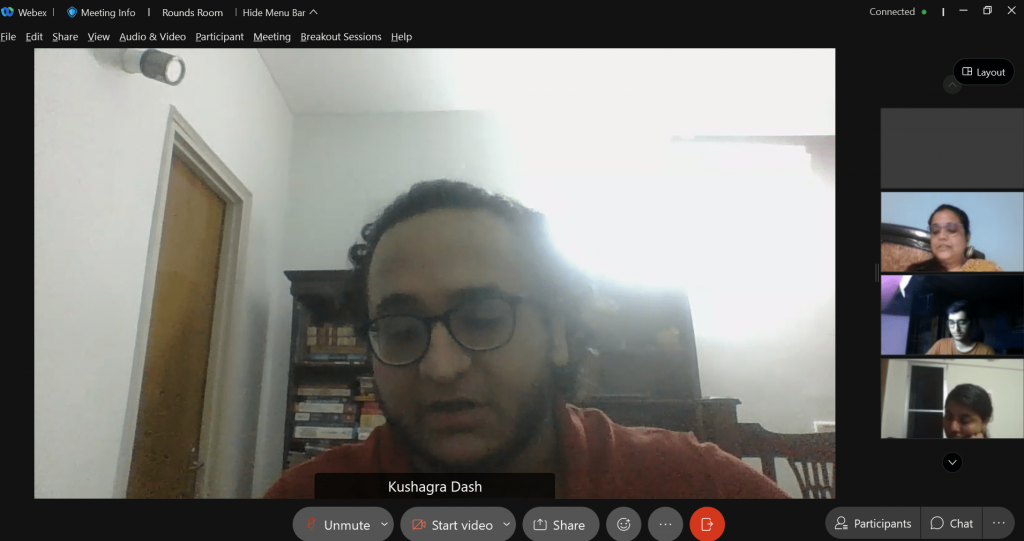
“UBA-NLUO Campus Plantation Drive- PRAKRITI”
01 Jul 2021
In nature, nothing is perfect and everything is perfect. Trees can be contorted, bent in weird ways, and they’re still beautiful.
-Alice Walker
Nature is God’s most beautiful creation. It felicitates the growth, development and nourishment of all its creatures. Unnat Bharat Abhiyaan cell of NLUO, a flagship program of Ministry of Education, organized a Mega Plantation Drive at the University campus on Thursday, 1 July 2021. Contribution to the Drive would continue till September 2021. The initiative named PRAKRITI, focused on the idea to conserve the Nature that we are living in. It upholds the idea to take out significant time to preserve the positive power that Nature shares with us. The initiative aims to build a good, fresh and healthier environment at the NLUO Campus.
Facilitated by the Horticulture Sub-Committee under UBA-NLUO cell, the Drive was inaugurated by Hon’ble Chancellor and Chief Justice of Odisha High Court, Dr Justice S. Muralidhar in the presence of Prof Ved Kumari, Vice -Chancellor, NLUO, Prof. (Dr.) Yogesh Pratap Singh, Registrar, Dr Kuntirani Padhan,Faculty Co-ordinator, UBA-NLUO cell and other faculties with administrative staff at the campus. The students witnessed the initiative through live-streaming via virtual platform. The presence of Hon’ble Chancellor sir encouraged the students to look after the planted saplings, plant more and more trees and encourage their peer and community to follow the same.
Various saplings of Gulmohar, Neelmohar, Golden Shower, Neem Kapok, and other shaded and flowering trees were planted by the dignitaries at different places on the campus. Presence of these trees will add to beautification of the campus and a better connection with the environment would be promoted. It would help in fostering strong mental and social health amongst students.





15.00
Normal
0
false
false
false
EN-IN
X-NONE
X-NONE
“Press Release – 1st NLUO PHFI Public Health Law Moot Court Competition – 2021.”
28 Jun 2021
27.06.2021
Press Release
Four day grand 1st NLUO PHFI Public Health Law National Moot Court Competition concludes
The four day long 1st NLUO PHFI Public Health Law National Moot Court Competition concluded today after a stellar final round between GLC Mumbai and NALSAR, Hyderabad was judged by eminent legal luminaries and public health experts including Mr. Anand Grover, Senior Advocate, Supreme Court of India, Dr. Gagandeep Kang, India’s leading virologist and Professor, CMC Vellore,?Mr. Murali Neelkanthan, Partner, Amicus, Mr. Sameer Sah, Partner, Khaitan & CO and Mr. Warren Bruke, Senior Attorney, United States House of Representatives, Office of Legislative Counsel. The moot focused on the issue of compulsory vaccination and immunity to vaccine developers and manufacturers along with ancillary issues of federalism in the context of Public Health policy.
The final rounds were followed by a grand valedictory ceremony which was graced by Hon’ble Justice Mr Sanjeeb Panigrahi, Judge, Orissa High Court as the Chief Guest and Dr. K Srinath Reddy, President, Public Health Foundation of India as Guest of Honor, Prof Ved Kumari, Vice -Chancellor, NLUO, Prof. (Dr.) Yogesh Pratap Singh, Registrar, NLUO, Prof. Shifalika Goenka, Professor PHFI?and the finalist judges. Hon’ble Mr Justice Sanjeeb Panigrahi stressed on importance of making the right to health as explicity mentioned fundamental right under the Constitution of India and gave a deeper nuance into the role of judiciary in protecting people’s right to health in the context of a pandemic. Dr. K Srinath Reddy and Prof Ved Kumari committed to make the Public Health moot an annual event at NLUO and praised the team for meticulously conducting the moot on grandiose scale by hosting 62 teams from across the length and breadth of the country.
Government Law College, Mumbai won the competition and will be awarded a cash prize of Rs 21,000. They also won the citation for ‘Best Memorial’ and will be awarded a separate cash prize of Rs 10000. Runners up, NALSAR Hyderabad will be awarded a cash prize of Rs. 15,000. Anshika Paul of Government Law College, Trivandrum was adjudicated the ‘Best Speaker’ and will get a prize money of Rs.10000.?Other hon’ble citations were ‘Fourth?Best Memorial’ to Himachal Pradesh National Law University, Shimla, ‘Third Best Memorial’ to Dr. Ram Manohar Lohia National Law University, Lucknow, ‘Second Best Memorial’ to Chanakya National Law University, Patna,?’Third Best Speaker’ as Anagha Ramdass from NUALS, Kochi and ‘Second Best Speaker’ to Nabeel M from School of Law, University of Mysore.
The valedictory session was an opportunity for all the participants to benefit from really incisive comments from all the distinguished guests. Mr Murali exhorted all the participants to read hand books, research, citations and sources of power. Dr Gangandeep and Dr K Srinath Reddy also stressed on the need of balancing the individual autonomy and State powers to protect people’s health.As the moot was a fusion of public health and law, the guests appreciated the interdisciplinary approach of the competition.
